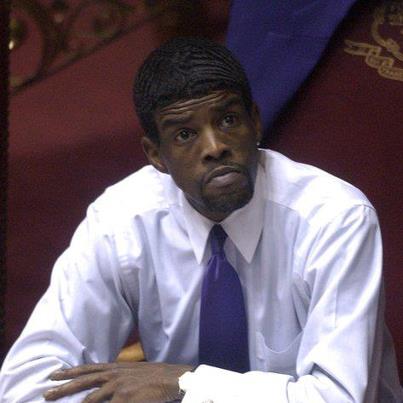
Former State Senator Ernie Newton will enter a not guilty plea Thursday morning at a scheduled hearing involving state charges that accuse him of manipulating $500 in campaign contributions to qualify for roughly $80,000 in public financing for his attempt to regain his old state senate seat last August. This is new territory for state prosecutors, bringing this type of case under Connecticut’s voluntary Citizens’ Election Fund program of financing campaigns, and has federal officials weighing violation of Newton’s federal supervised release following his 2006 sentencing on bribery and tax violations that forced him from public office.
Based on information the state has released so far the case centers on several disgruntled campaign workers who claim they were urged by Newton to falsify campaign donations that put him over the top to qualify for public dough. The state program requires candidates for state senate to raise $15,000 in donations of $100 and less to qualify for a larger pot of campaign money. The Connecticut General Assembly enacted the public financing program in 2005 following former Governor John Rowland’s guilty plea on corruption charges.

State charges against Newton do not allege he used public money for personal use, but he manipulated donations to advance public campaign funds to finance his race. Newton finished a close second to Andres Ayala in the senate primary. The state’s case places a premium on witnesses who came forward claiming they were stiffed by the campaign after representations by Newton they would be paid.
Newton has hired attorney Darnell Crosland to represent him in the state criminal complaint, and possibly a charge from the U.S. Department of Probation Newton violated terms of his three-year supervised release, a form of probation, set forth as part of his 2006 federal sentencing prohibiting illegal activity.
Federal law states if there is probable cause to believe a person on probation or supervised release has violated a condition of his release the probation officer assigned to the case may arrest him or seek a warrant for his arrest. Typically, it would be done by a warrant or summons served by the federal marshals, according to legal experts.
The probationer, in this case Newton, must receive clear notice of the alleged violation of the terms of his probation/release followed by a preliminary hearing to determine if probable cause exists the probationer violated a term of his supervised release. Assuming the answer to that is yes, the case would proceed in due course to a revocation hearing.
If that’s the case, the probationer is entitled to counsel. He is also entitled to notice of the charges, disclosure of the evidence against him, an opportunity to appear and present evidence and the chance to cross-examine adverse witnesses. The probation officer must prove the probationer violated a condition of his release. Unlike a regular criminal trial, however, the rules of evidence are not strictly enforced (hearsay can come in) and the burden of proof is “preponderance of the evidence” not “proof beyond a reasonable doubt.” The probation officer’s case is presented by an Assistant U.S. Attorney brought before a federal judge, in Newton’s case Robert Chatigny who was assigned to Newton’s supervised release following the retirement of Newton’s sentencing judge, Alan Nevas.
If the probation officer has proven a violation of a term of the probationer’s supervised release, the court has the options to extend the term of supervised release (if the original term was less than the max) or send the probationer to prison for the full term of his supervised release with no credit for the time he served on supervised release.
Legal experts say that most violations of supervised release cases generally involve straightforward, easily demonstrated offenses such as bank robbery, drug dealing and violating a protection order. The Newton case by comparison is complicated and would not seem easy to prove in a one- or two-day hearing.
So if Newton is charged with violating conditions of supervised release, federal officials will likely wait until the state case plays out before pursing a violation trial.


Mr. Newton deserves everything the state and Feds can throw his way. Here is a convicted felon who runs for office. He should have realized his campaign would be watched closely. Yet Mr. Newton thinks he can do what he wants and break the rules to qualify for public financing. He qualified for $80,000 but failed to pay his workers. Where did the $80,000 go? Back into his own pockets? Is that how he can afford Mr. Crosland?
Mr. Newton, you are a convicted felon who still has not learned a lesson.
Based on the information released so far by the state’s attorney’s office the case looks a little wobbly. But that doesn’t mean much at this point; prosecutors typically play their cards close to the vest. They must have a few more cards to show. They wouldn’t have brought criminal charges otherwise. There’s more to this than meets the eye. And the feds wouldn’t be considering a violation of probation charge unless there was more to it.
I will wait for the investigation to be complete before I do an all-out assault. I know Ernie has done some good in his life and sure he has helped a number of his constituents along the way. I must admit I am hoping Ernie is innocent. If Ernie is guilty he will be judged according to the law and not public opinion.
Ernie is The Teflon Moses.
Ernie Newton did not handle the nuts and bolts of his campaign, for that reason alone the State has no case.
Never took a dime, never gave a dime. This man is as clean as your Sunday morning whistle.
There’s more to this story. And while it may be true Ernie “Moses” Newton didn’t handle the day-to-day operations of his campaign, he did ask five campaign workers to sign documents so the campaign would fraudulently qualify for taxpayer funds. He also tampered with at least one witness.
Witness tampering is a serious charge. He also failed to pay his campaign workers, not to mention the mysterious $500 that somehow found its way to the desk of Ms. Williams within minutes after a call came in stating he came up short by that exact amount to qualify for the funding. The feds don’t fool around, they bring people up on charges only if they know they’ll stick. Based on what’s been brought forth thus far, I’d say Mr. Newton’s legal council has his hands full.
The feds can only charge Moses with violation of probation. The state brought the campaign violations. There’s more to this than meets the eye. Ernie pissed off the wrong people.
Of course the feds will sit back, which is reasonable, to see the outcome of the state’s charges. That outcome, which we already can figure out, will result in violation of probation. It appears he pissed off his own people who turned state’s witnesses. That’s what happens when you don’t pay your workers or coerce them into falsifying a document and then telling them to keep quiet about it.
*** NEWTON’S THE TYPE OF GUY WHO SEEMS TO JUST MAKE THE TEN COUNT, ESPECIALLY WHEN YOU THINK HE’S DOWN AND OUT! ***
Newton can’t count to ten.
Perhaps not, but he surely knew how to count to 500.
He only had to count five one-hundred-dollar bills.